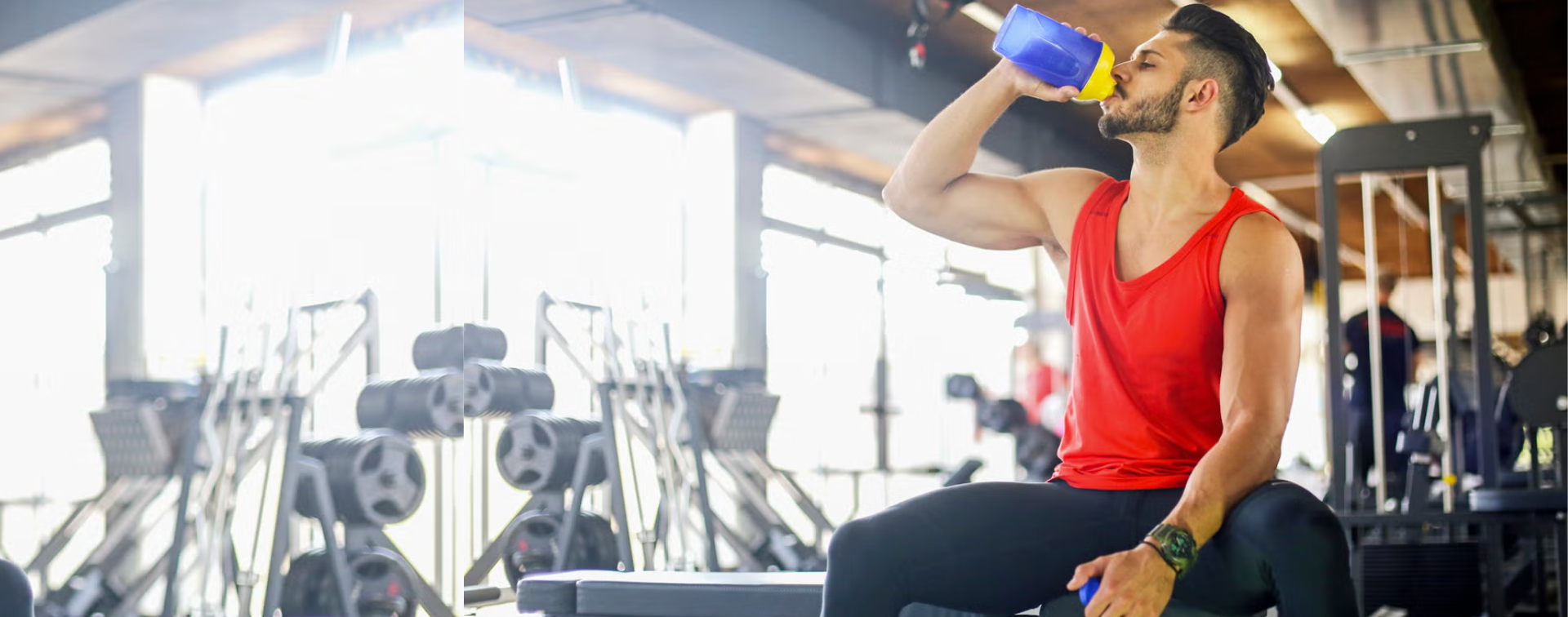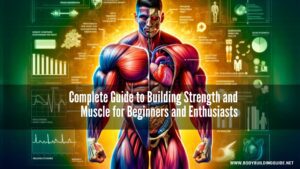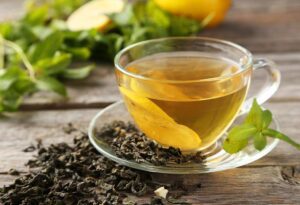Boost Your Bodybuilding Journey with Powerful Protein Supplements
Introduction:
Welcome, fitness enthusiasts! If you’re on a bodybuilding journey and looking to take your gains to the next level, incorporating the right supplements can be a game-changer. While supplements are not a magic bullet, they can provide that extra push and support your body needs to optimize muscle growth, enhance recovery, and improve overall performance. In this blog, we’ll explore some of the most effective supplements for bodybuilding and how they can help you achieve your fitness goals. Let’s dive in!
Protein Powders:
Protein is the cornerstone of any bodybuilding regimen. It is essential for muscle repair, growth, and recovery. Protein powders, such as whey protein, casein protein, and plant-based protein, are convenient and efficient sources of high-quality protein. They provide all the essential amino acids your muscles need, especially post-workout, when protein synthesis is crucial. Consider incorporating protein shakes into your routine to meet your daily protein requirements and support muscle development.
Creatine:
Creatine is a naturally occurring compound found in our muscles. It plays a key role in energy production during high-intensity exercise. By supplementing with creatine, you can increase your muscle’s phosphocreatine stores, leading to improved strength, power, and muscle mass. It also aids in enhancing anaerobic performance and reducing muscle fatigue. Creatine monohydrate is the most researched and cost-effective form, making it a popular choice for bodybuilders.
Branched-Chain Amino Acids (BCAAs):
BCAAs consist of three essential amino acids: leucine, isoleucine, and valine. They are crucial for muscle protein synthesis and preventing muscle breakdown. During intense workouts, BCAAs can help reduce muscle damage and promote faster recovery. They also act as an energy source during prolonged exercise, sparing muscle glycogen. Incorporate BCAA supplements into your routine to maximize muscle growth, improve endurance, and minimize muscle soreness.
Beta-Alanine:
If you’re striving for longer and more intense workouts, beta-alanine can be a valuable addition to your supplement stack. It increases muscle carnosine levels, which helps buffer the buildup of lactic acid, delaying fatigue and improving exercise performance. By taking beta-alanine supplements regularly, you can push through more reps, experience less muscle burn, and achieve greater training volume.
Omega-3 Fatty Acids:
While not directly related to muscle growth, omega-3 fatty acids offer numerous benefits for bodybuilders. These healthy fats have anti-inflammatory properties, support joint health, and aid in reducing exercise-induced muscle soreness. Additionally, omega-3s promote cardiovascular health, which is crucial for overall well-being during intense training. Include fish oil or algae-based omega-3 supplements in your regimen to reap these advantages.
Top 20 Best Protein Supplements for Bodybuilding: Fuel Your Gains
Introduction:
When it comes to bodybuilding, protein is the king of nutrients. It’s the building block of muscle tissue and plays a crucial role in muscle repair, growth, and recovery. While whole foods should be the foundation of your diet, protein supplements can provide a convenient and effective way to meet your daily protein requirements, especially for those who struggle to consume enough through meals alone. In this blog, we’ll explore the 20 best protein supplements for bodybuilding that can help you fuel your gains and reach your fitness goals. Let’s dive in!
Whey Protein Isolate:
Whey protein isolate is a popular choice among bodybuilders due to its high protein content and low lactose and fat content. It is quickly absorbed by the body, making it ideal for post-workout recovery. Whey isolate contains all the essential amino acids required for muscle growth and is available in various flavors, making it a versatile and convenient option.
Whey Protein Concentrate:
Whey protein concentrate is another excellent option for bodybuilders. It contains a slightly higher amount of lactose and fat compared to isolate but is still rich in protein. Whey concentrate provides a balanced amino acid profile and is often more affordable than isolate, making it a popular choice for those on a budget.
Casein Protein:
Casein protein is a slow-digesting protein that provides a sustained release of amino acids to the muscles over an extended period. It is an ideal choice for consuming before bed or during prolonged periods of fasting, such as during sleep. Casein protein helps prevent muscle breakdown and supports muscle recovery during periods of rest.
Egg White Protein:
Egg white protein is a highly bioavailable protein source derived from egg whites. It contains all the essential amino acids and is low in fat and carbohydrates. Egg white protein is suitable for those who are lactose intolerant or prefer an alternative to dairy-based proteins.
Plant-Based Protein Blends:
Plant-based protein blends, such as those made from pea, rice, hemp, and quinoa, have gained popularity among bodybuilders following a vegetarian or vegan lifestyle. These protein blends offer a complete amino acid profile and are often supplemented with enzymes for better digestion. They provide an excellent alternative for individuals who avoid animal-based products.
Beef Protein Isolate:
Beef protein isolate is derived from beef sources and is highly concentrated in protein. It contains all the essential amino acids necessary for muscle growth and is often free from lactose and gluten. Beef protein isolate is a good option for those looking to diversify their protein sources.
Collagen Protein:
Collagen protein has gained attention for its benefits beyond muscle growth. It supports joint health, promotes healthy skin, hair, and nails, and aids in gut health. While collagen protein is not a complete protein on its own, it can be a valuable addition to your overall protein intake.
Milk Protein Isolate:
Milk protein isolate is a combination of whey protein and casein protein. This blend provides a fast-digesting whey protein component along with the slow-release benefits of casein protein. It offers a sustained release of amino acids, making it a versatile option for any time of the day.
Soy Protein:
Soy protein is a plant-based protein derived from soybeans. It contains all the essential amino acids and has been shown to support muscle growth and recovery. Soy protein is a viable option for those who follow a vegetarian or vegan diet, but it may not be suitable for individuals with soy allergies or hormonal imbalances.
Hemp Protein:
Hemp protein is derived from hemp seeds and offers a complete amino acid profile. It is rich in omega-3 fatty acids and fiber, making it a nutritious addition to your diet. Hemp protein is easily digestible and can be used as a standalone protein source or blended with other plant-based proteins.
Pea Protein:
Pea protein is derived from yellow split peas and is highly digestible. It contains all the essential amino acids, particularly high levels of arginine, which supports healthy blood flow and muscle recovery. Pea protein is a popular choice for those with dairy or soy allergies and is often found in plant-based protein blends.
Rice Protein:
Rice protein is a hypoallergenic protein source derived from brown rice. It is easily digestible and provides a good amino acid profile. Rice protein is often combined with other plant-based proteins to create a complete protein blend.
Multi-Source Protein Blends:
Multi-source protein blends combine different protein sources to create a comprehensive amino acid profile. These blends may include whey, casein, egg, plant-based proteins, and more. They provide the benefits of various protein sources in one convenient product.
Goat Milk Protein:
Goat milk protein is an alternative to traditional dairy-based proteins. It contains all the essential amino acids and is often easier to digest for individuals with lactose intolerance. Goat milk protein is rich in nutrients and offers a creamy taste.
Micellar Casein:
Micellar casein is a slow-digesting form of casein protein. It forms a gel-like substance in the stomach, allowing for a gradual release of amino acids. Micellar casein is beneficial for prolonged periods of fasting or as a nighttime protein source.
Hydrolyzed Whey Protein:
Hydrolyzed whey protein is a form of whey protein that has undergone a process of enzymatic hydrolysis. This process breaks down the protein into smaller peptides, making it more quickly absorbed by the body. Hydrolyzed whey protein is often used for rapid post-workout recovery.
Blends with Added Enzymes:
Protein blends that include added enzymes, such as proteases and digestive enzymes, can enhance digestion and absorption. These enzymes help break down the protein into smaller components, allowing for better utilization by the body.
Natural and Organic Protein Powders:
Natural and organic protein powders are made from high-quality, minimally processed ingredients. They are free from artificial additives and are often sweetened with natural sweeteners like stevia or monk fruit extract. These options are ideal for those who prefer a more natural approach to their supplementation.
Low-Carb Protein Powders:
Low-carb protein powders are designed for individuals following a low-carbohydrate or ketogenic diet. These protein powders typically contain minimal carbohydrates and are often sweetened with non-caloric sweeteners. They provide the necessary protein without compromising your macronutrient goals.
Customizable Protein Blends:
Some brands offer customizable protein blends that allow you to create a personalized mix of protein sources, flavors, and additional ingredients. This option is perfect for those who want to tailor their protein powder to their specific needs and preferences.
Conclusion:
Choosing the right protein supplement for bodybuilding is a personal decision that depends on factors such as dietary restrictions, taste preferences, and individual goals. The 20 protein supplements mentioned in this blog offer a wide range of options to suit various needs. Remember, while protein supplements can be beneficial, they should complement a well-rounded diet that includes whole foods. Consult with a healthcare professional or registered dietitian to determine the best protein supplement for your bodybuilding journey. Fuel your gains, stay consistent, and embrace the rewards of your hard work in the gym!











маркетплейс аккаунтов соцсетей безопасная сделка аккаунтов
перепродажа аккаунтов платформа для покупки аккаунтов
площадка для продажи аккаунтов профиль с подписчиками
гарантия при продаже аккаунтов маркетплейс аккаунтов
биржа аккаунтов площадка для продажи аккаунтов
продажа аккаунтов соцсетей https://pokupka-akkauntov-online.ru
Account marketplace Sell Pre-made Account
Ready-Made Accounts for Sale Guaranteed Accounts
Purchase Ready-Made Accounts Buy Account
Website for Selling Accounts Account marketplace
Account Acquisition Account Trading Platform
Buy and Sell Accounts Marketplace for Ready-Made Accounts
Buy Pre-made Account https://accountsmarketplaceonline.com/
Website for Buying Accounts Sell Account
Account Buying Service Verified Accounts for Sale
sell pre-made account account market
buy accounts account catalog
account market buy account
secure account sales social media account marketplace
account selling service account acquisition
account exchange service account marketplace
website for buying accounts account purchase
account selling platform verified accounts for sale
account exchange https://discountaccountsmarket.com
account exchange service account store
buy account account trading platform
account trading service buy account
account selling service account market
account sale account purchase
online account store online account store
account buying service accounts market
account marketplace account trading platform
accounts market marketplace for ready-made accounts
secure account purchasing platform account purchase
database of accounts for sale gaming account marketplace
account sale account selling service
ready-made accounts for sale secure account purchasing platform
secure account sales https://sale-social-accounts.org
account trading platform buy accounts
account buying platform find accounts for sale
account sale marketplace for ready-made accounts
account market https://accounts-offer.org
accounts marketplace https://accounts-marketplace.xyz
accounts marketplace https://social-accounts-marketplaces.live/
account marketplace https://accounts-marketplace.live
accounts for sale https://social-accounts-marketplace.xyz
gaming account marketplace https://buy-accounts.space/
buy accounts https://buy-accounts-shop.pro/
sell account https://buy-accounts.live
website for buying accounts https://accounts-marketplace.online/
account purchase https://social-accounts-marketplace.live
account exchange https://accounts-marketplace-best.pro
продажа аккаунтов https://akkaunty-na-prodazhu.pro
продажа аккаунтов https://rynok-akkauntov.top/
купить аккаунт https://kupit-akkaunt.xyz/
маркетплейс аккаунтов akkaunt-magazin.online
маркетплейс аккаунтов https://akkaunty-market.live
маркетплейс аккаунтов kupit-akkaunty-market.xyz
маркетплейс аккаунтов соцсетей магазины аккаунтов
маркетплейс аккаунтов https://online-akkaunty-magazin.xyz/
продать аккаунт akkaunty-dlya-prodazhi.pro
купить аккаунт https://kupit-akkaunt.online
fb accounts for sale buy facebook ads accounts
buy fb account https://buy-ad-accounts.click
facebook accounts to buy facebook accounts for sale
buy old facebook account for ads buy facebook old accounts
buy facebook advertising facebook ads account for sale
buy facebook ads manager buy-ads-account.work
buy facebook profiles https://ad-account-for-sale.top
buy facebook accounts cheap buy aged fb account
buy google ad threshold account https://buy-ads-account.top
buy google ads agency account https://buy-ads-accounts.click
cheap facebook accounts https://buy-accounts.click
buy google adwords account https://ads-account-for-sale.top
buy google agency account https://ads-account-buy.work/
google ads account for sale google ads account buy
buy google ad account https://buy-account-ads.work/
buy google ads verified account https://buy-ads-agency-account.top/
buy google ads accounts buy google ads account
buy google ad account buy account google ads
buy verified facebook business manager account https://buy-business-manager.org/
google ads account seller https://buy-verified-ads-account.work
buy facebook business manager accounts https://buy-bm-account.org/
buy bm facebook https://buy-verified-business-manager-account.org/
buy verified facebook business manager https://buy-verified-business-manager.org
facebook business manager account buy fb bussiness manager
buy verified facebook business manager account https://business-manager-for-sale.org
buy facebook business account buy-business-manager-verified.org
business manager for sale https://buy-bm.org/
buy verified facebook https://buy-business-manager-accounts.org/
buy tiktok ads accounts https://buy-tiktok-ads-account.org
buy tiktok ads buy tiktok business account
tiktok ads agency account tiktok agency account for sale
tiktok ad accounts https://tiktok-agency-account-for-sale.org
tiktok ads account for sale https://buy-tiktok-ad-account.org
buy tiktok business account https://buy-tiktok-ads-accounts.org
tiktok ads account buy https://tiktok-ads-agency-account.org
tiktok agency account for sale https://buy-tiktok-business-account.org
buy tiktok ads account https://buy-tiktok-ads.org
I’d constantly want to be update on new posts on this internet site, saved to fav! .
Hello. excellent job. I did not anticipate this. This is a excellent story. Thanks!
Hi, just required you to know I he added your site to my Google bookmarks due to your layout. But seriously, I believe your internet site has 1 in the freshest theme I??ve came across. It extremely helps make reading your blog significantly easier.
¡Hola, descubridores de riquezas !
Casino online extranjero sin comprobaciГіn de direcciГіn – п»їhttps://casinoextranjerosespana.es/ п»їcasinos online extranjeros
¡Que disfrutes de asombrosas premios extraordinarios !
¡Saludos, cazadores de suerte !
Casino sin registro con juegos sin interrupciГіn – https://casinossinlicenciaenespana.es/ casinossinlicenciaenespana.es
¡Que vivas triunfos extraordinarios !
¡Saludos, buscadores de tesoros!
Mejores casinos online extranjeros para juegos instantГЎneos – п»їhttps://casinosextranjerosenespana.es/ casino online extranjero
¡Que vivas increíbles victorias épicas !
¡Hola, cazadores de oportunidades!
Casino online fuera de EspaГ±a accesible desde EspaГ±a – п»їп»їhttps://casinoonlinefueradeespanol.xyz/ casinos online fuera de espaГ±a
¡Que disfrutes de asombrosas momentos memorables !
¡Saludos, amantes de la adrenalina !
ВїQuГ© bonos da casino online extranjero hoy? – https://www.casinoextranjerosenespana.es/# casinoextranjerosenespana.es
¡Que disfrutes de oportunidades exclusivas !
¡Bienvenidos, descubridores de riquezas !
Casino fuera de EspaГ±a con red de afiliados – п»їhttps://casinoporfuera.guru/ casinos fuera de espaГ±a
¡Que disfrutes de maravillosas triunfos legendarios !
¡Hola, descubridores de oportunidades!
Mejores proveedores en casinos online extranjeros seguros – п»їhttps://casinoextranjero.es/ casinos extranjeros
¡Que vivas jugadas asombrosas !
¡Saludos, fanáticos de las apuestas !
Top casinos online fuera de EspaГ±a 100% confiables – https://casinosonlinefueraespanol.xyz/# п»їcasino fuera de espaГ±a
¡Que disfrutes de oportunidades únicas !
¡Hola, amantes del ocio y la emoción !
Casino online extranjero con compatibilidad total – https://www.casinosextranjerosdeespana.es/# mejores casinos online extranjeros
¡Que vivas increíbles instantes únicos !
¡Bienvenidos, apostadores apasionados !
Casinos fuera de EspaГ±a con licencia internacional – https://www.casinofueraespanol.xyz/ casinos fuera de espaГ±a
¡Que vivas increíbles jugadas magistrales !
¡Hola, descubridores de oportunidades únicas!
casino por fuera compatible con pago mГіvil – п»їhttps://casinosonlinefueradeespanol.xyz/ casinos fuera de espaГ±a
¡Que disfrutes de asombrosas tiradas brillantes !
¡Saludos, participantes del reto !
Mejores casinos online extranjeros con juegos clГЎsicos – п»їhttps://casinoextranjerosdeespana.es/ mejores casinos online extranjeros
¡Que experimentes maravillosas movidas impresionantes !
Hello guardians of breathable serenity!
Air Purifier for Smoke – Tested for Tobacco Odor – https://bestairpurifierforcigarettesmoke.guru/# air purifier for smoke
May you experience remarkable invigorating spaces !
¡Hola, amantes del ocio y la emoción !
Casinos online sin licencia con bonos de bienvenida – http://casinosinlicenciaespana.xyz/# casinosinlicenciaespana
¡Que vivas increíbles jackpots impresionantes!
¡Bienvenidos, exploradores de posibilidades !
Casinos sin licencia espaГ±ola instantГЎneo – http://mejores-casinosespana.es/ Mejores-CasinosEspana.es
¡Que experimentes maravillosas tiradas afortunadas !
¡Hola, exploradores de oportunidades exclusivas !
Casino sin registro y bonos activados automГЎticamente – https://www.casinosonlinesinlicencia.es/ casinos no regulados
¡Que vivas increíbles giros afortunados !
Well I truly liked reading it. This article provided by you is very effective for accurate planning.
¡Saludos, entusiastas del éxito !
Casino regalo bienvenida: juega sin pagar – http://bono.sindepositoespana.guru/ bono casino espaГ±a
¡Que disfrutes de asombrosas premios excepcionales !
Greetings, seekers of contagious laughter !
Jokes for adults clean but far from boring – п»їhttps://jokesforadults.guru/ funny text jokes for adults
May you enjoy incredible side-splitting jokes !
cheap facebook advertising account database of accounts for sale marketplace for ready-made accounts
buying facebook ad account website for buying accounts sell account
¿Saludos clientes del casino
Los mejores casinos europeos permiten invitar amigos con enlaces personalizados que otorgan recompensas a ambos. Es una forma de crecer la comunidad. casinos europeos Jugar en grupo tambiГ©n tiene ventajas.
Los jugadores espaГ±oles estГЎn optando por casinos online europeos ante las restricciones locales impuestas por la DGOJ. En estos casinos europeos online puedes jugar sin limitaciones y con mГЎs libertad. AdemГЎs, sus promociones son mucho mГЎs atractivas.
ВїEs confiable casinosonlineeuropeos.guru? RevisiГіn completa – п»їhttps://casinosonlineeuropeos.guru/
¡Que disfrutes de grandes recompensas !
There are definitely quite a lot of details like that to take into consideration. That could be a nice point to bring up. I supply the thoughts above as general inspiration however clearly there are questions just like the one you deliver up the place a very powerful factor can be working in trustworthy good faith. I don?t know if finest practices have emerged round things like that, but I am sure that your job is clearly identified as a good game. Both girls and boys feel the affect of only a moment’s pleasure, for the remainder of their lives.
I’m still learning from you, while I’m improving myself. I certainly love reading all that is posted on your website.Keep the stories coming. I enjoyed it!
I like what you guys are up too. Such clever work and reporting! Carry on the superb works guys I’ve incorporated you guys to my blogroll. I think it will improve the value of my website :).
As I website owner I think the subject matter here is rattling good, thanks for your efforts.